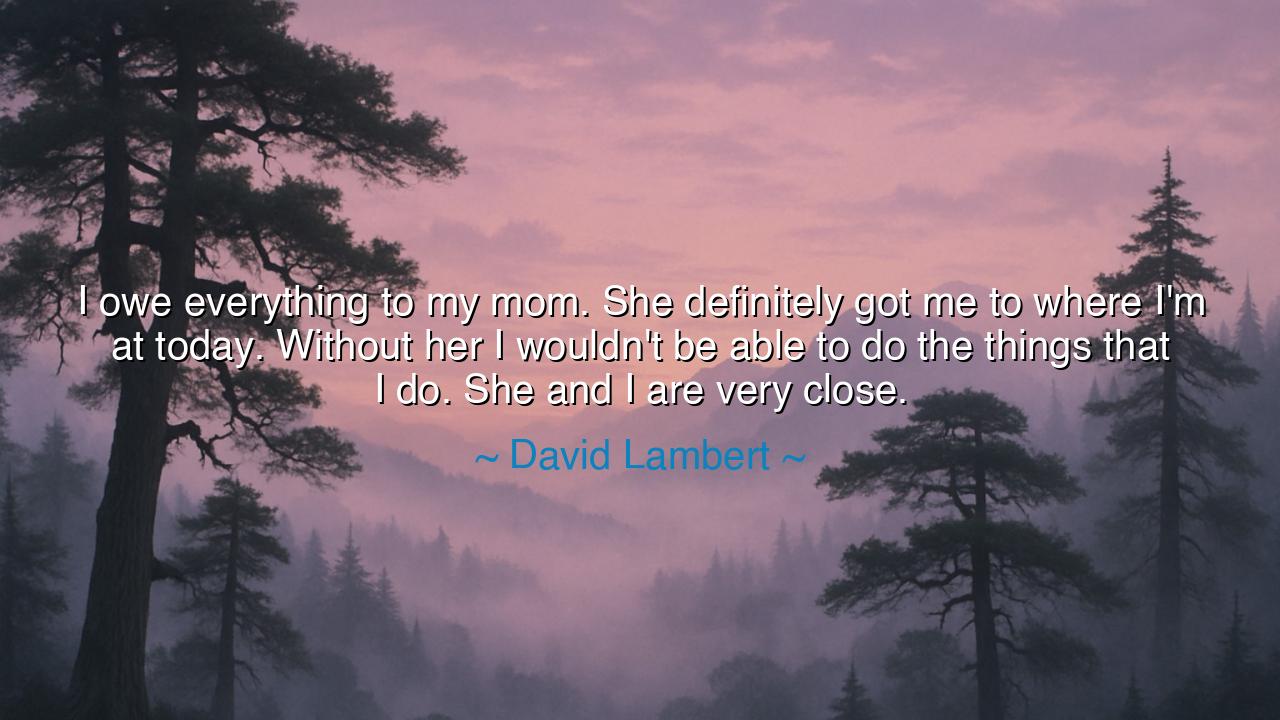
I owe everything to my mom. She definitely got me to where I'm at
I owe everything to my mom. She definitely got me to where I'm at today. Without her I wouldn't be able to do the things that I do. She and I are very close.






The words of David Lambert — “I owe everything to my mom. She definitely got me to where I’m at today. Without her I wouldn’t be able to do the things that I do. She and I are very close.” — echo one of the oldest truths of humanity: that a mother’s love is both the foundation and the compass of a life well-lived. Beneath these simple words lies a timeless story — of sacrifice, guidance, and devotion that transcends blood and time. It is a confession born not of obligation, but of awe — the kind of gratitude that knows it can never be repaid.
To say “I owe everything to my mom” is to speak a truth as ancient as the earth itself. Every civilization, from the valleys of the Nile to the temples of the East, has bowed before the sacred figure of the mother. For she is not only the giver of life, but the shaper of destiny. Through her hands, the child learns strength; through her eyes, the child learns worth; through her heart, the child learns what it means to love. The ancients believed that every great man or woman carried within them the silent prayers of their mother — that unseen, unending energy that moves mountains long after her voice is gone.
When David Lambert speaks of his closeness to his mother, he touches upon a bond that is spiritual as much as it is emotional. The mother and child are connected not merely by blood, but by memory, by rhythm, by the invisible threads of care that weave through years of laughter and hardship. She walks beside him in every victory he celebrates, for her faith is the unseen root from which his success has grown. This is the quiet heroism of motherhood — to labor in love, and rejoice from the shadows.
History offers countless mirrors of this truth. Consider Alexander Hamilton, whose mother, Rachel Faucette, defied convention and endured exile to protect and educate her son. Though she died when he was young, her courage became the seed of his brilliance. He carried her strength through storms of politics and war, often speaking of her with reverence and sorrow. Like Lambert, he owed everything to her, for she was both his first teacher and his unseen guardian. Such stories remind us that a mother’s influence is not measured by years, but by depth — the way her spirit carves into the soul of her child.
The heart of Lambert’s words lies in gratitude — that rare and noble recognition of those who built us while expecting nothing in return. Gratitude is more than memory; it is humility. It is the understanding that we are not self-made, but shaped by the sacrifices of others. His confession, “Without her I wouldn’t be able to do the things that I do,” is an act of wisdom. It tells us that to acknowledge those who carried us is not weakness — it is strength of the highest order.
In the rhythm of these words, one can also feel devotion — not the idolizing kind, but the genuine closeness that arises from shared struggle and trust. The bond between Lambert and his mother reminds us that love, when tended with care, becomes a lifelong friendship. The mother is no longer just the one who raised him; she becomes the confidante, the grounding voice, the reminder of who he truly is when the world grows loud. Such closeness is a treasure beyond fame or fortune.
Let this teaching, then, be passed down: honor the ones who carried you when you could not carry yourself. In a world obsessed with independence, remember the sacred interdependence that gave you breath. Visit your mother, or her memory. Speak her name in gratitude. Let your achievements be not a monument to yourself, but a living offering to her sacrifice. For the truest success is not measured in wealth or recognition, but in how deeply we remember the hands that lifted us to stand.
And so, may we all live with the same reverence that David Lambert expresses — a reverence born of love, of closeness, of awe. For when we say, “I owe everything to my mom,” we are not merely praising one woman — we are acknowledging the eternal power of motherhood itself, that divine force that shapes nations, nurtures dreams, and sustains the human heart across generations.






AAdministratorAdministrator
Welcome, honored guests. Please leave a comment, we will respond soon